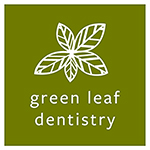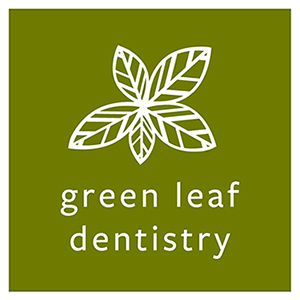As we step into 2019, many of us have made a resolution or two that ultimately serves to improve our overall health. At Green Leaf Dentistry, we challenge you to improve your oral health by following the recommendations below. Since studies have shown that oral health directly impacts our overall systemic health, you will in effect be satisfying two New Year’s resolutions!

- Brush twice daily for at least 2 minutes each time. For many of us brushing our teeth is something we quickly do before running out the door to school or to work and before bed when we are exhausted. The consequence is that we rarely spend the required amount of time to adequately remove the plaque from our teeth and our technique tends to be less than desirable. For optimal plaque removal, place your toothbrush at a 45 degree angle to the gum line and make small circles as you move across the arch covering both the front and back surfaces of the teeth. It is important to start at the gum line because this is where the plaque tends to accumulate. Also, make sure you are using a soft bristled toothbrush, or better yet, an electric toothbrush to minimize trauma to the gum tissue.
- Floss your teeth! Yes, I said it. I know that for many individuals flossing is a bi-annual event that occurs prior to their dental visit; however, flossing is just as essential as brushing! Unfortunately, our toothbrush bristles cannot get in between our teeth to effectively remove food and plaque, so flossing is critical to reduce the risk of dental decay between teeth and of course to improve the health of your gums. Whether you like traditional floss or floss sticks or use a floss aid, it doesn’t matter. Floss your teeth once daily, preferably at night before you go to bed, and do it well. Your gums will thank you for it later.
- Reduce consumption of refined sugars, juice, soda and sports drinks. Sugar remains the primary fuel for oral bacteria, which when metabolized produces lactic acid that erodes tooth enamel causing tooth decay. Highly acidic beverages such as soda and sports drinks can have a similar effect. Frequency of consumption of these items is an important point that cannot be understated. Consuming a small treat or having an acidic beverage once daily with a meal is significantly less harmful to the teeth than if these items are consumed throughout the day. The former represents an isolated introduction of sugar or acid into the oral cavity, which is balanced out by the meal. Continual grazing or sipping, however, is extremely detrimental because the teeth are essentially being bathed in sugar and/or acid, resulting in high rates of dental decay.
- Drink water. A simple yet effective recommendation with benefits galore. Water is nature’s cleanser and is critical to one’s overall health. After a meal, water rinses our mouths of debris and restores the pH of our oral cavity to neutral, thereby reducing the acid attack on our enamel. Water should be consumed throughout the day, in lieu of juice, soda or sports drinks, as a means of hydrating our bodies, maintaining our mental alertness and keeping our oral cavity clean. For those with access to fluoridated water, they will benefit from additional protections against dental cavities conferred by fluoride in their water.
- Eat more fruits and vegetables in their raw form. Also, a simple and effective recommendation that has widespread systemic benefits. Hard, raw fruits and vegetables are known to be beneficial to our overall health as they are packed with vitamins and nutrients. Perhaps less appreciated is the fact that these items in their unadulterated forms facilitate tooth cleansing and stimulate the teeth and supporting bone during chewing. This is in stark contrast to overly processed/cooked foods, which lack texture (and are often devoid of nutrition) and tend to coat teeth.
- Visit your dentist at least twice annually for a routine cleaning and check-up to identify any potential issues early so that they can be treated in the most conservative manner possible.
- Smile! Last but certainly not least, smile. Smiling is infectious and has been shown to improve one’s mood and to positively impact others, so why not give it a try?

